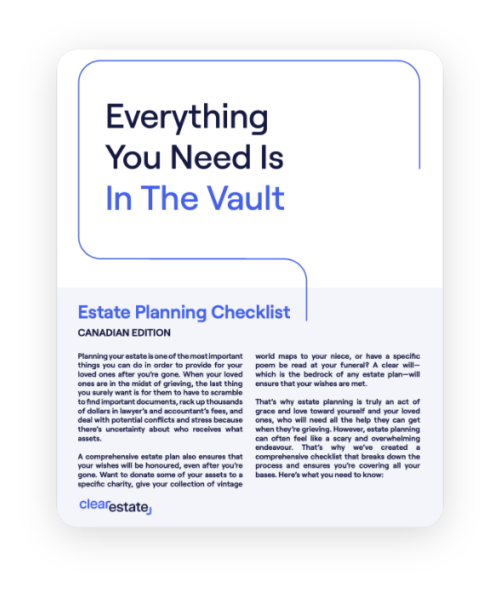Estate Planning
Nov 29, 2024
7 Critical Trust Fund Mistakes Parents Must Avoid in 2025
Setting up a trust fund? Learn the biggest mistake parents make and ensure your child's financial security with expert guidance.
Probating an estate without a will presents its own set of challenges. Here’s how to apply for a certificate of appointment of estate trustee when there’s no will.


The death of someone close to you is a difficult period to navigate. Not only do you have to deal with the grief and stress of losing a loved one, but you may also find yourself in the position of having to deal with the belongings they’ve left behind. This is known as settling someone’s estate, and the most common way to do that is to apply for probate at the Ontario Superior Court of Justice.
In the ideal case, your loved one would have left behind a will that clearly names an executor for their estate and lays out how their estate will be distributed among friends and family. The named executor then applies for a certificate of appointment of estate trustee, which basically grants them the authority to settle the estate and go through probate.
However, life is not always ideal, and you may discover that your loved one did not leave behind a will. Here’s how you navigate the process of applying for a certificate of appointment when there’s no will.
As mentioned before, a certificate of appointment is a legal document that states that your petition for probate has been granted and that you now have the authority to act as executor or trustee on the estate’s behalf.
If there’s a will and you’ve been named as the estate’s executor or trustee, then the job of obtaining a certificate of appointment falls to you. It doesn’t matter if you’re not the deceased’s next of kin. If you’re named in the will, you are the appointed executor. However, if the deceased left no will, then someone will have to apply for a certificate of appointment without a will, which is also known as probate.
The guidelines for who can apply for a certificate of appointment without a will are very specific:
You have to be a resident of Ontario;
You have to be the deceased’s closest living relative, or
You have to be the deceased’s spouse or common-law partner.
If you meet these criteria, then you can go ahead and apply for the certificate. It’s worth noting that if the deceased wasn’t married and had no close living relatives, the court will appoint the next-best appropriate party to obtain the certificate of appointment.
The appointed person must then apply for a certificate of appointment without a will at the Ontario Superior Court of Justice. While the process is similar to applying for a regular certificate of appointment when a will is present, the absence of a will makes the process take a little longer since the applicant must obtain consent from all beneficiaries who have a claim to the estate.
In order to apply, you’ll need to submit various forms and documents (as hard copies) to the court. These include:
A death certificate;
A list of the estate’s total value and the assets included in the estate;
Payment of the estate administration tax. You can find out how high the tax will be with our handy probate tax calculator.
Necessary application forms.
The application forms you’ll need to submit to the court are the following:
Notice of Application (Form 74.17). This notice must be sent to all beneficiaries who have a claim to the estate, so that they know someone is applying to probate the estate.
Affidavit of Service of Notice (Form 74.16). This is a supplementary form to notify a beneficiary who has, for whatever reason, been overlooked when notices of applications were sent.
Affidavit of Service (Form 74.16). This form proves that everyone who has a claim to the estate has been informed of the probate proceedings.
Application (Form 74.14). This is the actual application for the certificate of appointment.
Certificate of Appointment of Estate Trustee (Form 74.20). And this is the certificate that grants the trustee the authority to settle the estate if the application was successful.
If you find yourself struggling to navigate the probate process without a valid will, help is just one click, phone call, or email away. Our experienced probate professionals can help you navigate this process effectively and efficiently. Get in touch today for a free consultation and find out how we can assist you.
 Secure Your Legacy
Secure Your Legacy
Get your free 12-step Estate Planning checklist now. 89% of readers complete their estate plan within 3 months of using our guide.
Instantly Access Now